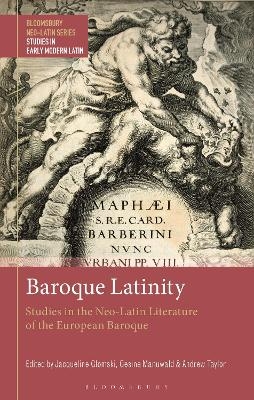
Baroque Latinity
Bloomsbury Academic (Verlag)
978-1-350-32347-6 (ISBN)
- Noch nicht erschienen (ca. April 2025)
- Versandkostenfrei
- Auch auf Rechnung
- Artikel merken
A key aim of the volume is to address the distinctiveness of these texts by interrogating the usefulness and specificity of the term ‘Baroque’, especially in relation to the classical rules it transgresses to produce effects of grandeur, richness, and exuberance in a range of secular and sacred arts (e.g. music, architecture, painting), as well as various forms of literature (e.g. prose, poetry, drama). The contributors consider how and why Latin writing mutated from earlier humanist paradigms, thus exploring how ideas of ‘early modern’ and ‘Baroque’ are related, and examine the interplay of the theory and practice of the ‘Baroque’, including its debts to and deviations from ancient models, and its limits and limitations.
Jacqueline Glomski is Honorary Senior Research Fellow at University College London, UK, Vice-President of the Society for Neo-Latin Studies (SNLS), and a fellow of the Royal Historical Society. She has co-edited the collected volumes Seventeenth-Century Libraries: Problems and Perspectives (forthcoming), Seventeenth-Century Fiction: Text and Transmission (2016), and Acta Conventus Neo-Latini Monasteriensis: Proceedings of the Fifteenth International Congress of Neo-Latin Studies (2015). Andrew Taylor is Senior Lecturer, Fellow and Director of Studies in English at Churchill College, University of Cambridge, UK. He has published widely on Renaissance literature and has edited Neo-Latin and Translation in the Renaissance (2014), The Early Modern Cultures of Neo-Latin Drama (2013), and Neo-Latin and the Pastoral (2006), the latter two both with Philip Ford. Gesine Manuwald is Professor of Latin at University College London, UK, and President of the Society for Neo-Latin Studies (SNLS). She has published a number of articles on early modern Latin literature and edited the collected volume Neo-Latin Poetry in the British Isles (Bloomsbury, 2012) with Luke Houghton.
List of contributors
Preface
1 Introduction (Gesine Manuwald, UCL, UK and Andrew Taylor, Churchill College, Cambridge, UK)
2 The sixteenth century’s revolution in rhetoric and its impact on the Baroque (Lucy R. Nicholas, Warburg Institute, UK)
3 The Greekness of Neo-Latin wit: Hermogenes and ingenuity in Julius Caesar Scaliger’s Poetices libri septem (Javiera Lorenzini Raty, KCL, UK)
4 The triumph of the saint: St Casimir Jagiellon and the militant motifs in Baroque hagiographical poetry (Patryk Ryczkowski, Universität Innsbruck, Austria)
5 Innovation and fusion: Sarbiewski’s theory of Baroque literary style (Tomas Riklius, Vilnius University, Lithuania)
6 Christ’s blood or Mary’s milk? ‘Clarus Bonarscius’, Baroque piety and English Protestant outrage (Alison Shell, UCL, UK)
7 An example of Baroque Latinity through the inclusion of ancient literary models into modern thought: Claude-Barthélemy Morisot’s Peruviana (1644) (Valérie Boutrois-Wampfler, University of Reims Champagne-Ardenne, France)
8 Maffeo Barberini’s poems for the Farnese family in early Baroque Rome (Stephen J. Harrison, University of Oxford, UK)
9 Mannerisms in Latin Baroque poetry by Paul Fleming (1609–40) and Georg Gloger (1603–31) (Beate Hintzen, Universität Bonn, Germany)
10 What makes a Neo-Latin tragedy Baroque? (Jan Bloemendal, Royal Netherlands Academy/Huygens Institute, Netherlands and James Parente, University of Minnesota, USA)
11 Asses at the lyre: Latin as musical language and the benefits of exclusion (Eric Bianchi, Fordham University, USA)
12 Latin motet texts in seventeenth-century Rome and the Exercitia spiritualia of St Ignatius of Loyola (Adrian Horsewood, Royal Birmingham Conservatoire, UK)
Index
| Erscheinungsdatum | 04.10.2023 |
|---|---|
| Reihe/Serie | Bloomsbury Neo-Latin Series: Studies in Early Modern Latin |
| Verlagsort | London |
| Sprache | englisch |
| Maße | 156 x 234 mm |
| Themenwelt | Literatur ► Klassiker / Moderne Klassiker |
| Schulbuch / Wörterbuch ► Wörterbuch / Fremdsprachen | |
| Geisteswissenschaften ► Sprach- / Literaturwissenschaft ► Anglistik / Amerikanistik | |
| Geisteswissenschaften ► Sprach- / Literaturwissenschaft ► Literaturgeschichte | |
| Geisteswissenschaften ► Sprach- / Literaturwissenschaft ► Literaturwissenschaft | |
| Geisteswissenschaften ► Sprach- / Literaturwissenschaft ► Sprachwissenschaft | |
| ISBN-10 | 1-350-32347-0 / 1350323470 |
| ISBN-13 | 978-1-350-32347-6 / 9781350323476 |
| Zustand | Neuware |
| Informationen gemäß Produktsicherheitsverordnung (GPSR) | |
| Haben Sie eine Frage zum Produkt? |
aus dem Bereich


